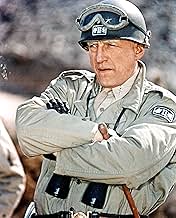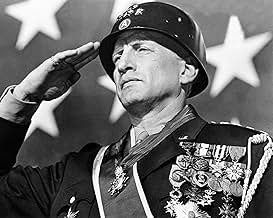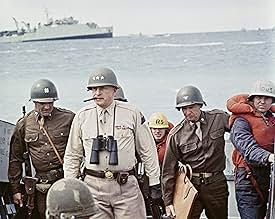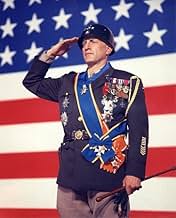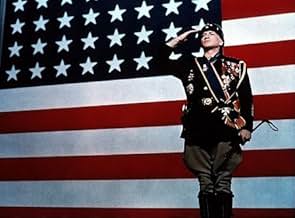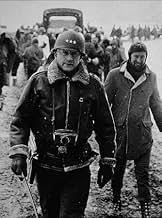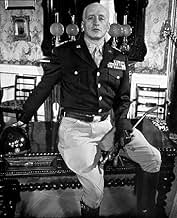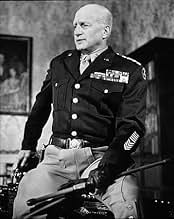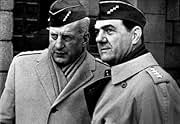Patton
- 1970
- Tous publics
- 2h 52m
The World War II phase of the career of controversial American general George S. Patton.The World War II phase of the career of controversial American general George S. Patton.The World War II phase of the career of controversial American general George S. Patton.
- Won 7 Oscars
- 25 wins & 8 nominations total
Carey Loftin
- General Bradley's Driver
- (as Cary Loftin)
Pat Zurica
- First Lieutenant Alexander Stiller
- (as Patrick J. Zurica)
Richard Münch
- Colonel General Alfred Jodl
- (as Richard Muench)
Summary
Reviewers say 'Patton' is acclaimed for George C. Scott's compelling performance as General George S. Patton, highlighting his complexity. The film is lauded for its epic scope, Franklin J. Schaffner's direction, and powerful war sequences. However, some critics find it lacking in secondary character development and note its lengthy runtime. Historical accuracy is debated, with concerns over anachronisms and creative liberties. Despite these issues, 'Patton' is recognized as a pivotal war film, offering profound insights into leadership and the intricacies of war.
Featured reviews
. . . and it's not even about the war. There's no wall to wall action. In fact, World War II is merely the setting a backdrop so to speak and the battles are all downplayed in favor of giving the audience a glimpse into the brilliance (or insanity) of the historically significant character, Patton. From the script on up, everything plays out wonderfully to bring the famous general to life on screen, and after watching George C. Scott deliver his Oscar-worthy performance, I find it hard to believe there were a number of actors on the list above his name.
George C. Scott's performance of Patton is one I consider the greatest given of any war film. Patton is a champion for freedom while sometimes equally as much of a tyrant as the ones he's trying to put down, he's a monster and a hero, and neither he nor the filmmakers give a damn about political correctness. I found the character to be an overly harsh prick, myself, but in some strange way, very likeable and sympathetic, and when watching the movie again I don't look at the screen and say, `Hey, there's George C. Scott.' Instead it's, `Hey, there's Patton.' Not very many film characters have a personality strong enough to overtake the actor playing them. I appreciate that depth and that degree of realism, this attention to detail on the parts of Scott and Schaffner.
Schaffner surprised me by somehow managing to capture my interest on a subject matter I'd ordinarily write off as too silly (Planet of the Apes); two years later, he applied that same technical know how, craft, and intelligent storytelling towards a film whose subject appeals to me from the get go, and once again I'm impressed. There are some great war films out today; however, Schaffner's take pursued the most unique perspective in all realms, and captured my imagination with such ease . . . I can't help but come back to it over other war films.
And I have to comment on the score, which is not only one of my favorite Goldsmith scores but also one of my favorite war-film scores. Jerry Goldsmith matched point for point the brilliance of Franklin Schaffner's vision, the depth of George C. Scott's performance, and somehow managed to captured the essence of both musically. A good music score is one that tells the story of the film in its own unique voice. Goldsmith's score has such a prominent voice in the experience of Patton, that to remove it would be the equivalent of removing Schaffner's direction or George C. Scott.
Lastly, how accurate is the film? Not a clue, and even if it is completely false, I don't care. I've never been about writing history papers based on cinema experiences. All I know for certain is that Patton is a very entertaining and well balanced movie that holds up very well thirty years later, and it's a film that can be admired for its craft.
George C. Scott's performance of Patton is one I consider the greatest given of any war film. Patton is a champion for freedom while sometimes equally as much of a tyrant as the ones he's trying to put down, he's a monster and a hero, and neither he nor the filmmakers give a damn about political correctness. I found the character to be an overly harsh prick, myself, but in some strange way, very likeable and sympathetic, and when watching the movie again I don't look at the screen and say, `Hey, there's George C. Scott.' Instead it's, `Hey, there's Patton.' Not very many film characters have a personality strong enough to overtake the actor playing them. I appreciate that depth and that degree of realism, this attention to detail on the parts of Scott and Schaffner.
Schaffner surprised me by somehow managing to capture my interest on a subject matter I'd ordinarily write off as too silly (Planet of the Apes); two years later, he applied that same technical know how, craft, and intelligent storytelling towards a film whose subject appeals to me from the get go, and once again I'm impressed. There are some great war films out today; however, Schaffner's take pursued the most unique perspective in all realms, and captured my imagination with such ease . . . I can't help but come back to it over other war films.
And I have to comment on the score, which is not only one of my favorite Goldsmith scores but also one of my favorite war-film scores. Jerry Goldsmith matched point for point the brilliance of Franklin Schaffner's vision, the depth of George C. Scott's performance, and somehow managed to captured the essence of both musically. A good music score is one that tells the story of the film in its own unique voice. Goldsmith's score has such a prominent voice in the experience of Patton, that to remove it would be the equivalent of removing Schaffner's direction or George C. Scott.
Lastly, how accurate is the film? Not a clue, and even if it is completely false, I don't care. I've never been about writing history papers based on cinema experiences. All I know for certain is that Patton is a very entertaining and well balanced movie that holds up very well thirty years later, and it's a film that can be admired for its craft.
It really doesn't get any better than this one, for realism, casting, set, costumes, scenery..........and all based on a true story. I can see why Scott won Best Actor and the film won BEST MOVIE. Epic movie in all aspects. Every person should watch this movie...... to see what the troops of England and the USA went through during WWII. My father fought in the Ardens during the Battle of the Bulge and he said the scene when Patton was marching up to get the 101st, with the heavy snow in the trees and the 88's blasting the tops of the trees off, took him right back to the heavy fighting where he was severely wounded. It was that realistic. "Patton" is one of my favorite WWII movies and a possible stopping point if it comes up in my "Recommendations" when surfing. This has a little bit of everything going for it, including great acting (Carl Malden and George C. Scott), historically accurate feel, a good bit of drama, and even some humor. "Patton" is one of the best and most honored war films of all time. (8 Academy Awards, including Best Picture, 1970.)
10nabor7
Not much can be said of this movie that already hasn't been said. It captures the war, the man, and the conflict of the two. I thought the movie was very nicely tied together and I thought the reflections of Patton on the past was very necessary. Patton believed in reincarnation so in looking back at historical battles you can see how Patton developed his strategy. He was a student of great leaders and commanders and the movie developed that thought really well. The movie presented the characters, the actual war history, and the Germans extremely well and it is no wonder this movie received the awards it did. After watching this movie over and over again, I'm convinced that no one could have played Patton any better than George C. Scott. You can tell from the movie that he put everything he had into the character. My father-in-law was an officer under Patton in the 3rd. Army and has said over and again how realistic the movie is. I would recommend this movie to anyone looking for an excellent re-telling of WWII history.
My only complaint with this film is several of the battle scenes play way too long. The first one in N. Africa, especially, is tension-less muddle. Due to the narrative focus on the affairs of the generals the battles are not very good and after are hard to follow. This is exceedingly minor in context because of not only the fog of war but history is what history is. I mention this because despite this issue I rather like this film, despite Patton (the man) being a brute and authoritarian. He was not a 20th century man. That says more about him than the 20th century.
The screenplay is, easily, the best part of the film. By the use of sarcasm and pointed barbs the film manages to place Patton the man in the proper context and despite Patton the man being pro-war make an anti-war film; it is really a very clever piece of writing that allows both hawks and doves to be really engaged with the storyline (which largely handles the history well). Best of all, this use of irony and sarcasm allows the film to show Patton as a complex, paradoxical and hypocritical figure. Patton the man loved the smell of battle but couldn't understand why fine young men had to die in war. He is a man who read his Bible every goddamn day. It is a sight to behold the mess and contradictions Patton lived by. And the screenplay effortlessly keeps the viewer orientated of what is happening in the war.
Scott is of course tailored made for the role and he gives his best career performance. Malden is also really engaging. The technical aspects give the film its proper weight. This is an exemplar of what a biopic can be.
The screenplay is, easily, the best part of the film. By the use of sarcasm and pointed barbs the film manages to place Patton the man in the proper context and despite Patton the man being pro-war make an anti-war film; it is really a very clever piece of writing that allows both hawks and doves to be really engaged with the storyline (which largely handles the history well). Best of all, this use of irony and sarcasm allows the film to show Patton as a complex, paradoxical and hypocritical figure. Patton the man loved the smell of battle but couldn't understand why fine young men had to die in war. He is a man who read his Bible every goddamn day. It is a sight to behold the mess and contradictions Patton lived by. And the screenplay effortlessly keeps the viewer orientated of what is happening in the war.
Scott is of course tailored made for the role and he gives his best career performance. Malden is also really engaging. The technical aspects give the film its proper weight. This is an exemplar of what a biopic can be.
The best comment on this film was made by my father. This was the last movie he saw in a theater. He had served under Patton in WW2 and said that Scott had nailed Patton's character and mannerisms so perfectly that halfway through the opening speech, he expected Scott/Patton to look down and say, "$@%#$@, Sears, get a haircut - your hair's too &#%#$%@ long!"
Oscars Best Picture Winners, Ranked
Oscars Best Picture Winners, Ranked
See the complete list of Oscars Best Picture winners, ranked by IMDb ratings.
Did you know
- TriviaThe movie begins without showing the 20th Century-Fox logo, or any other indication that the film is starting. At military bases across the US theater owners reported that soldiers in the audience would often stand up and snap to attention when they heard the movie's opening line ("Ten-hut!"), assuming it to be a real call to attention.
- GoofsContrary to the way it's portrayed in the film, the controversy over George S. Patton's Knutsford speech was not over his having insulted the Russians (in fact, the Army quickly revised the initial transcript of his remarks to reflect that he had mentioned them). It had to do with his talk of "ruling the world" after the war - members of Congress said he had no business as a general commenting on post-war political affairs, while others objected to the notion of the US, Britain or anyone else "ruling the world."
- Crazy creditsOne of the very, very few Twentieth Century-Fox films in which that company's logo is not shown at all, beginning or end. The film simply begins with the opening speech, and the opening Fox logo is replaced with an in-credit text-only notice after the speech. However, recent television showings have added the logo (not on DVD prints), and the addition is obviously spliced in from another piece of film.
- Alternate versionsThe Italian version is approximately 20 minutes shorter and removes all scenes set in the German Military HQ and/or showing German officers: although the credits still include the names of German performers, like Karl Michael Vogler as Marshall Rommel, their characters never appear onscreen in the Italian release.
- ConnectionsEdited into Opération Cobra (1972)
- SoundtracksTo the Colors
(uncredited)
Traditional bugle call used in lieu of the National Anthem. Played at the opening scene.
Details
- Release date
- Country of origin
- Official site
- Languages
- Also known as
- Patton: A Salute to a Rebel
- Filming locations
- Cabo de Gata, Almería, Andalucía, Spain(desert scenes)
- Production company
- See more company credits at IMDbPro
Box office
- Budget
- $12,000,000 (estimated)
- Gross US & Canada
- $61,749,765
- Gross worldwide
- $61,749,765
- Runtime
- 2h 52m(172 min)
- Color
- Aspect ratio
- 2.20 : 1
Contribute to this page
Suggest an edit or add missing content



